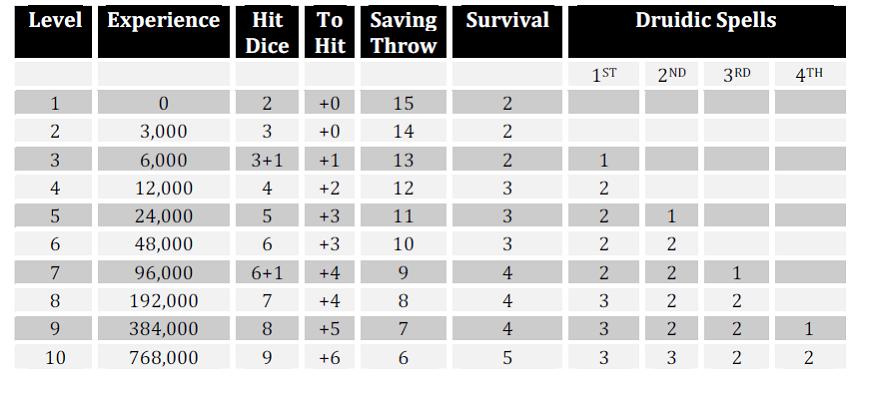THE RANGER
This is adapted from the Ranger I proposed in my Blog. The changes are in response to Szymon Piecha's Hunter class in Expanded Lore, which presents a character class specialising in hunting and fighting distinct monster types. This provides an opportunity to scale the Ranger back to its core concept, abandoning some of the combat-themed Feats in favour of more wilderness skills and nature-mysticism.
Rangers are woodsmen and scouts who protect the people of the peaceful realms from the dangers of the wilds. Rangers are attuned to Nature just as Paladins serve their Lawful gods. Rangers must always be Lawful, although Chaotic Barbarians (Anti-Rangers) do exist and may be chosen if the Referee agrees. Rangers are usually Human but at the Referee’s discretion Elves may also be Rangers.
Armour & Weapon Restrictions
Rangers may use any weapons and wear leather armour or chain mail but not plate mail, which is impractical for their wilderness lifestyle. They can use all magic items usable by Fighters but also a Staff of the Snake and any Druidic magic items.
Spell Casting
Rangers cast Druidic spells but do not acquire spell-casting power until they reach 3rd level.
You will notice this offers lots more Druidic spells to Rangers, so much so that they function almost as Fighter/Druid multiclassed. To reflect this, Rangers now have higher XP requirements, in fact the highest in the game except for actual multiclassed demihumans.
Survival
Rangers roll 1d6 to test their Survival skill, looking to roll their target number or less. Survival allows Rangers to recognise and follow tracks in the wilderness6. If they attempt this in a dungeon or town setting, the target number is reduced by -1. They must test their Tracking skill again if the tracks go through a door or cross a river.
Survival can also be used to forage for food to feed 1d6 people, to detect pits and snares in the wilderness (but not in dungeons) and to identify herbs and fungi and their properties.
Survival can also be used to forage for food to feed 1d6 people, to detect pits and snares in the wilderness (but not in dungeons) and to identify herbs and fungi and their properties.
Alertness
Rangers are only surprised 50% of the time (i.e. on a roll of 1 on a d6 rather than 1-2).
Saving Throws
Rangers gain a +2 bonus against the powers of wilderness monsters (e.g. giant animals, poisonous plants, fey creatures, lycanthropes)
Establish a Stronghold
At ninth level, a Ranger who chooses to build a fortress is considered to have reached the rank of “Ranger Knight”. The character may choose to attract a body of loyal Humans and Elves and may include fey creatures (Centaurs, Lawful Lycanthropes, Treants, Unicorns) at the Referee’s discretion.
Solitary Wanderers
Rangers may only own goods that they can carry on their person. They should give away extra treasures to worthy causes. No more than two Rangers can adventure together in a group.
Trauma
Rangers do not gain Trauma from searching corpses, travelling through the wilderness in extreme weather or being alone in a dangerous place (on lookout, scouting ahead, etc.).
Ranger Feats
- Corner the Quarry: If you successfully managed to track down monsters using Survival, you and your party receive a +1 To-Hit and damage bonus while fighting them.
- Far Seer: The Ranger can use scrolls and magic items that confer detection abilities, clairvoyance, clairaudience, telepathy and ESP. They do not need to use Read Magic to identify and use these spells on scrolls and automatically understand the commands needs to activate magic items with these powers.
- Herbalist: The Ranger heals 1d6+1 HP when binding wounds and when treating Fatal Wounds the patients receives a bonus to their saving throw equal to the Ranger’s Survival score. With the right herbs, the Ranger can treat any disease in 2d6 days.
- Land Lore: Choose a type of terrain (hills, forests, mountains, deserts, swamps); in this environment you enjoy the benefit of TWO other Ranger Feats (e.g. Herbalism and Wild Stealth) but you do not have these Feats in other environments unless you select them normally.
- Shadow Wanderer: The Ranger leaves no trace when he travels and can confer this on a number of other followers equal to his level. The Ranger and his followers can become invisible in wilderness settings when camped.
- Trapper: You may use your Survival skill to create a trap in a wilderness setting; if successful, the trap targets a single creature for 1d6 damage and stuns them for 1d6 rounds. It takes a turn to create a trap.
- Tracker: The Ranger’s range of success on Survival rolls is increased by 1.
- Vigour: +2 to all saving throws.
- Wild Stealth: You and your party surprise enemies on 1-3 (rather than 1-2)


